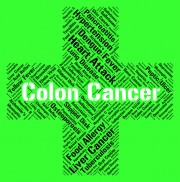Treat colon cancer at Samitivej Sukhumvit Hospital
Colon cancer screenings combined with medical advancements at Samitivej Sukhumvit Hospital in Bangkok have improved treatment and recovery for this disease

Who is at risk?
Genetic factors such as a family history of colon cancer or cancers affecting the breast, kidney, lung and bile duct, places an individual at a higher risk of colon cancer. A diet low in fibre and/or high in red meat and other diseases of the colon, such as inflammatory bowel disease, also contributes to the development of cancer. People with metabolic syndromes, such as diabetes, obesity, fatty liver or high cholesterol, also run an increased risk of colon cancer.
“Most people have a lot of stress in terms of lifestyle changes and that leads to more diseases similar to the Western countries,” says Dr Pitulak Aswakul, a gastroenterologist and hepatologist at Samitivej Sukhumvit Hospital, referring to the rates of colon cancer in the west.
Screenings help to prevent colon cancer
The importance of screening for polyps or growths inside the colon cannot be emphasised enough as it can help prevent the development of cancer. “Colon cancer development is critical; about 70 to 80 percent of colon cancer develops from a small polyp,” says Dr Pitulak.
A polyp is a growth inside the colon that will gradually increase in size and can develop into a cancer within three to five years. However, not all polyps become cancerous. Detection and removal of a polyp, before it turns cancerous, can prevent colon cancer.
Courtesy of colon cancer screenings, patients who have been diagnosed at the advanced stages of colon cancer have decreased. High-risk individuals should be screened before they are 50 years old.
A colonoscopy is a procedure to examine the colon. The colonoscope is inserted through the anus and up the whole length of the colon. This procedure itself takes about 20 to 35 minutes on average. If any polyps are detected, the procedure may take longer as they would have to be removed.
Advancements in colon cancer treatment have reduced recovery periods
Treatment modalities for colon cancer have evolved since the advent of minimally-invasive surgery, such as laparoscopy, a medical procedure to examine the interior of the abdominal or pelvic cavity using a slender tube, called a laparoscope. The instrument is inserted through a small incision to assist with diagnosis or treatment of a number of different diseases and conditions. In the past, treatment requiring open surgeries meant a patient had to be admitted into hospital for a minimum of two weeks. However, minimally invasive surgery usually requires patients to be admitted for only three or four nights, and many patients are able to resume regular activities within a few weeks after undergoing laparoscopic surgery.
Recovery and prevention of a relapse
For the first few days after colon surgery, a patient is advised to fast and then gradually move on to liquid and soft diets. A balanced diet high in fibre is recommended for patients who have been treated for colon cancer. As nutrition is crucial for recovery, there are no dietary restrictions.
For patients formerly diagnosed with colon cancer, continued screening for early detection of polyps; a lifestyle change which includes regular exercise and a controlled diet rich in fibre and fluids, while low in red meat and fats; and regular follow-up sessions are ways to minimise the risk of getting colon cancer again.
About Samitivej Sukhumvit Hospital
Samitivej Sukhumvit Hospital is a JCI-accredited, award-winning facility in Bangkok, Thailand providing international-standard healthcare. Built in 1979, the hospital’s commitment to quality care and innovation has kept it at the forefront of medical technology. Today, the hospital is recognised as a provider of choice for both local residents and expatriates living in Thailand. Samitivej Sukhumvit Hospital has been recognised by the United Nations Children’s Fund (UNICEF) and World Health Organization (WHO). The hospital also has an immigration counter to assist foreigners with visa and other immigration requirements.
For more details on the latest technology, please visit Samitivej Hospitals.
Samitivej Sukhumvit Hospital
133 Sukhumvit 49 Klongtan Nua, Vadhana Bangkok 10110
Tel: +66 (0) 2022 2222
Email: info@samitivej.co.th
www.samitivejhospitals.com/sukhumvit/
Related Articles
“Tidal wave” of cancer predicted
WHO predicts doubling of annual cancer cases by year 2034
Read moreWhat you need to know about 9 most common cancers
Cancer is the second leading cause of death globally, and is responsible for an estimated 9.6 million deaths in 2018. Globally, about 1 in 6 deaths are caused by cancer.
Read moreWhat is prostate cancer?
Parkway Cancer Centre’s Dr Zee Ying Kiat gives the low-down on prostate cancer
Read moreLatest Articles
Medical Care
Clinical Exercise Physiologist (CEP): The Emerging of Exercise is Medicine
How Exercising can be a Medicine
Read moreMedical Care
Reversing type 2 Diabetes: Embracing Hope and Determination
Experience the remarkable journey of Ash and his grandfather Atok as they conquer type 2 diabetes through unconventional methods, showcasing the power of love and determination over adversity.
Read moreMedical Care
Bladder Cancer: What You Need to Know
Empower yourself with our comprehensive guide to bladder cancer. Explore symptoms, diagnosis, treatments, and supportive resources to safeguard your health.
Read more